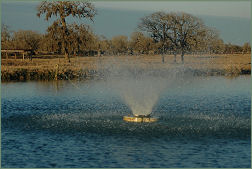 Fishing ponds are beneficial to the environment. They act as natural reservoirs, conserving water while offering a self-sustaining cycle of hydration keeping plants alive in them and nearby. Meanwhile, ponds take up space in a good way– unlike grass, they don’t need to be mowed. Gas-powered mowers create air pollution, so having a pond on your property automatically means less mowing and fewer pollutants.
Fishing ponds are beneficial to the environment. They act as natural reservoirs, conserving water while offering a self-sustaining cycle of hydration keeping plants alive in them and nearby. Meanwhile, ponds take up space in a good way– unlike grass, they don’t need to be mowed. Gas-powered mowers create air pollution, so having a pond on your property automatically means less mowing and fewer pollutants.
Did you know that utilizing a pond filter is a way to collect natural fertilizer that’s better for the environment than traditional fertilizers? The sludge from a pond filter contains good stuff to use as fertilizer– nutrient-rich fish droppings, excess fish food and leaves all combine to make a fine, natural fertilizer.
Ponds support local wildlife. While most people think of ponds as being filled with fish, they often forget that ponds attract dragonflies, frogs and birds. Furthermore, baby frogs and toads are good pond inhabitants since they help control algae growth. Older ones are helpful because they eat insects.
A pond’s ecosystem includes the shore, surface film, open water and bottom water. While some people look at a pond and think nothing of it, there’s actually a whole world teaming with life and energy in and around a pond.
Curious youngsters who study ponds find out how a natural ecosystem works. Thus, ponds help create environmental awareness. People can figure out how certain little changes affect the pond’s ecosystem for good or bad. Ponds also teach us how to care for our environment. Simple things like picking up trash around or in ponds can serve as a good reminder to people of all ages how it’s important to take care of nature that surrounds us.
Fishing ponds are also good for fishing for food. Many fathers and sons and mothers and daughters have fished ponds in order to catch a delicious supper.
Since 1980, the Kenneth Henneke Fish Hatchery has strived to help people effectively manage their ponds. Find out more information by emailing info@hennekehatchery.com.
